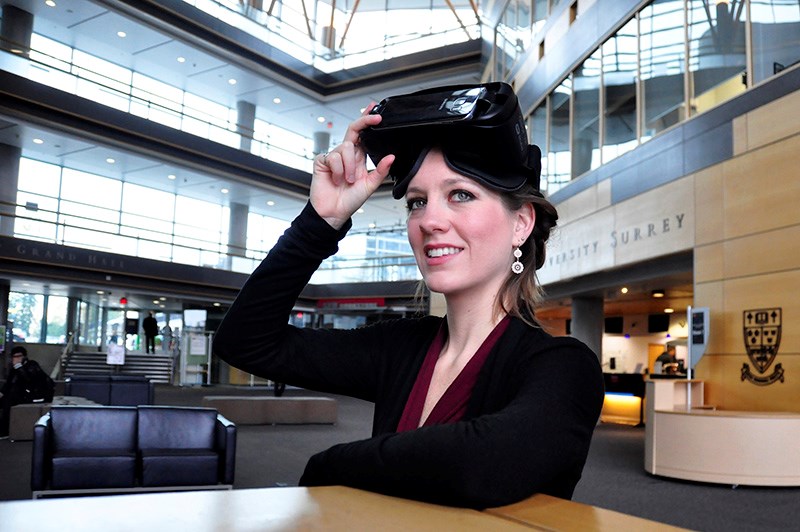Using virtual reality to solve real problems might seem the stuff of science fiction movies but a Coquitlam PhD candidate is trying to make it happen.
Denise Quesnel, a graduate student at Simon Fraser University’s School of Interactive Arts and Technology, is studying how VR can create transformative experiences to spark personal change or even societal shifts.
Quesnel is convinced VR technology has way more potential than its current common application as an entertainment medium. She said using the technology to immerse users in unfamiliar environments can create a sense of awe that has the power to change how that person views the world or a personal crisis.
Her assertion comes from first-hand experience.
A lifelong sufferer of juvenile arthritis, Quesnel said she often struggled with feelings of isolation because her disability was largely invisible to everyone around her and she couldn’t properly convey to them the challenges the disease presented. But a chance encounter with a virtual reality installation by Canadian artist Char Davies showed her a new way.
“It was so moving, I thought, what if you could communicate in these immersive environments?” Quesnel said of her visit to a piece that allowed her to breathe in tandem with a tree. “It was kind of an ‘a-ha!’ moment to use this for positive ways.”
That led Quesnel, who’d worked in the film and special effects industry for more than 10 years, to launch VR Village, a forum that gathers virtual reality projects from around the world, some of which are demonstrated at an annual conference of computer graphics and interactive technology professionals and enthusiasts.
Quesnel’s research at SFU hopes to harness VR’s wow factor for change, especially as the technology becomes cheaper and more widely accessible.
Working with stressed students nearing end-of-term exams, Quesnel used Google Earth to offer them a virtual trip to anywhere they wanted to go. While a few travelled to exotic, remote locations or renowned monuments, many opted for a virtual visit to their hometown, along the streets where they grew up, in the parks where they played.
“It was like they were recalling their entire previous life,” Quesnel said. “I could tell something very different was happening.”
During a debrief with the students, Quesnel said many of them reported feeling calmer, more connected after their virtual voyage. Some said they would make a better effort to stay in touch with friends and family back home.
That kind of personal shift can be broadened to a societal level by using VR to create empathy for problems such as mental illness and poverty.
“We tend not to look beyond the surface of people,” Quesnel said. “We look at them and we have no idea what is going on.”
Virtual reality, especially when it’s enhanced with emerging technologies that can engage other senses like smell and touch, can put people in the shoes of those who are suffering and help them empathize with their challenges.
“To understand them, you need to experience it first-hand,” Quesnel said. “Once you adjust your mental model, you’re never the same.”



